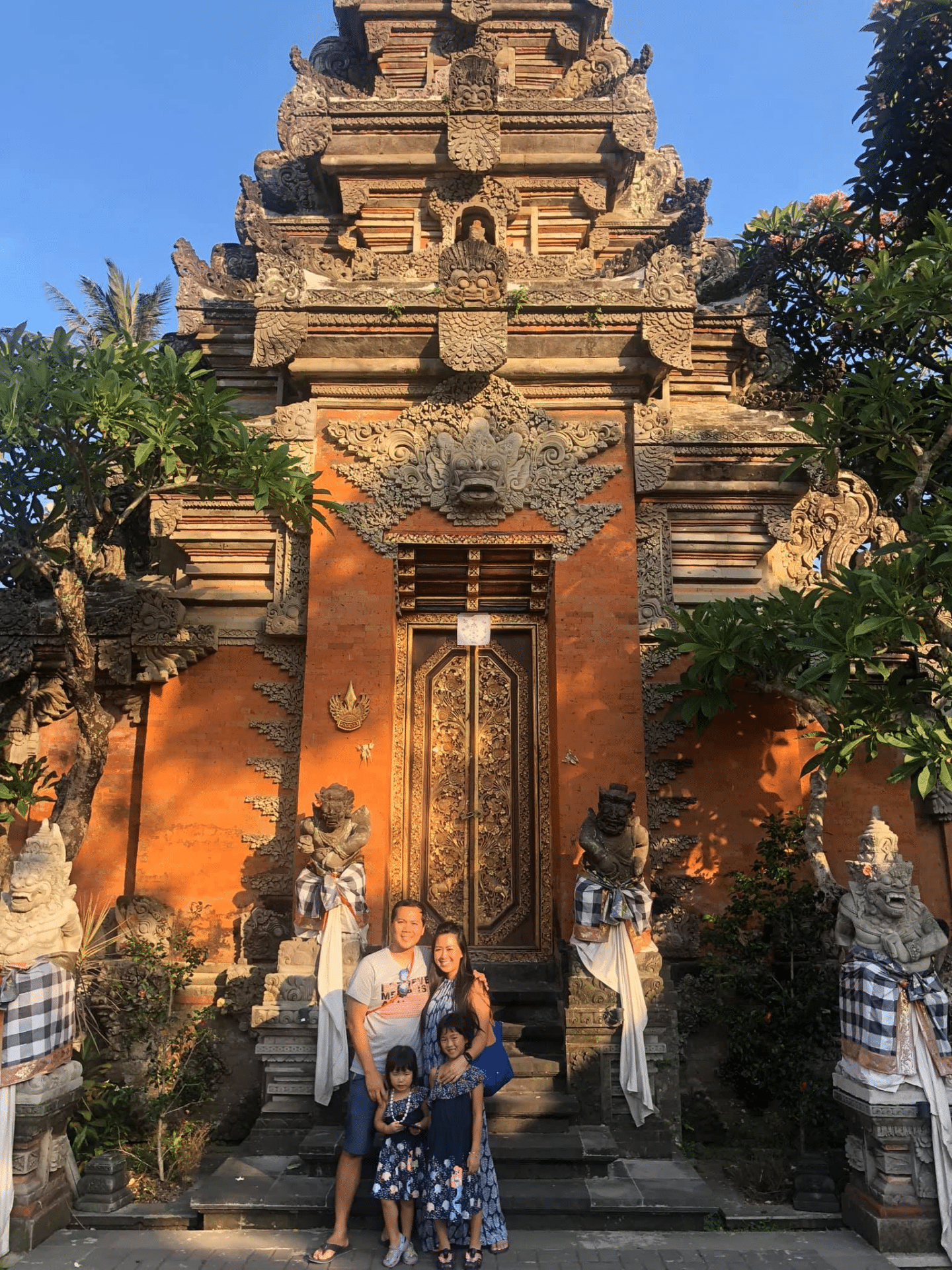Embark on a journey to Ubud, Bali, a haven where the essence of culture, nature, and culinary artistry blend seamlessly. Ubud invites travelers to immerse themselves in its enchanting landscapes, rich artistic heritage, and diverse gastronomic experiences. This Ultimate Guide to Ubud uncovers the top 20 must-see sights and culinary delights in Ubud, ensuring your adventure is both memorable and profound.
Brief History of Ubud
Ubud, nestled in the heart of Bali, Indonesia, has a rich history that intertwines with the legacy of its kings and a vibrant cultural heritage. The name “Ubud” is derived from the Balinese word “ubad,” meaning medicine, attributable to the abundance of medicinal herbs and plants in the area. This historical significance of Ubud as a center for healing and spiritual refuge dates back centuries, laying the foundation for its evolution into the cultural and artistic hub it is today.
The history of Ubud is closely linked to the Majapahit Kingdom’s expansion from Java to Bali in the 14th century. The subsequent migration of nobles, priests, and artisans to Bali brought with them a sophisticated culture and Hindu religion, which took root in Ubud, fostering a unique Balinese Hindu culture that thrives to this day. The influence of these Javanese settlers is evident in Ubud’s elaborate temple ceremonies, traditional dance performances, and distinctive arts and crafts.
By the late 19th century, Ubud came under the rule of the Sukawati Royal Family, who were pivotal in nurturing and preserving the town’s cultural heritage. The king of Ubud during this period, Tjokorda Gede Agung Sukawati (1910–1978), was especially influential. Alongside his brother, Tjokorda Raka Sukawati, and foreign artists they welcomed to Ubud, such as Walter Spies from Germany and Rudolf Bonnet from the Netherlands, they played a crucial role in promoting Balinese art and culture. Their efforts helped to establish Ubud as a global center for arts, attracting artists, scholars, and travelers from around the world to its serene and inspiring environment.

The Sukawati Royal Family was also instrumental in developing Ubud as a tourist destination, recognizing early on the potential of Bali’s unique culture and natural beauty to attract visitors. They supported the establishment of art studios, galleries, and cultural institutions, which led to a flourishing of the arts in Ubud. The king’s vision extended to the preservation of Ubud’s natural environment and cultural traditions, amidst the growing influx of tourism.
Today, Ubud stands as a testament to the foresight of its kings and the resilience of its people, maintaining its reputation as a sanctuary for the arts, culture, and spirituality. The town’s royal palaces and temples continue to be central to the community’s social and religious life, hosting festivals and ceremonies that draw both locals and tourists. The legacy of the kings of Ubud lives on, not only in the physical landmarks but in the enduring spirit of creativity, harmony, and cultural pride that defines Ubud.
The Ultimate Guide to Ubud
1. Explore the Majestic Ubud Monkey Forest
Nestled within a lush forest, the Ubud Monkey Forest is a sanctuary that houses over 700 monkeys. Wander through the dense foliage, ancient statues, and sacred temples, but keep your belongings secure as these playful primates roam freely. This ethereal forest is not just about monkeys; it’s a spiritual and conservation center where the harmony between humans and nature is celebrated. This destination is the top spot on our Ultimate Guide to Ubud.

2. Marvel at the Tegalalang Rice Terrace
Experience the iconic Tegalalang Rice Terrace, where emerald-green paddies cascade down slopes, demonstrating the Subak system, a traditional cooperative irrigation method. The best times to visit are early morning or late afternoon, when the light casts a magical glow over the terraces, offering spectacular photo opportunities and a chance to witness the essence of rural Bali.
3. Visit the Ubud Royal Palace
The Ubud Royal Palace, known as Puri Saren Agung, stands as a symbol of Bali’s cultural and artistic legacy. Its intricately carved gates and architecture are a testament to the island’s craftsmanship. In the evenings, the palace grounds become a stage for mesmerizing traditional Balinese dance performances, under the stars.

4. Shop at Art Market Ubud
Dive into the vibrant atmosphere of the Ubud Art Market, located opposite the royal palace. This bustling marketplace is filled with stalls selling everything from silk scarves and handmade woven bags to unique sculptures and traditional Balinese paintings. Haggling is expected, so come prepared to negotiate for the best deals.
5. Admire Pura Taman Saraswati
Dedicated to the goddess of wisdom and art, Saraswati, this temple boasts a breathtaking front pond filled with blooming lotuses. Intricate carvings and architecture reflect the temple’s spiritual significance. Evening dance performances here offer a cultural spectacle set against the temple’s illuminated backdrop.
6. Take the Campuhan Ridge Walk
Escape to the Campuhan Ridge for a scenic walk that offers panoramic views of Ubud’s natural landscape. This easy trek is best enjoyed during the cooler hours of the day, either at dawn or dusk, providing a tranquil setting away from the town’s hustle and bustle. The path leads through lush valleys and rural vistas, perfect for contemplation and nature photography.
7. Delve into Goa Gajah
Also known as the Elephant Cave, Goa Gajah is an archaeological marvel dating back to the 9th century. The entrance, a menacing mouth of a demon, leads into a cave used for meditation. The surrounding complex, with its bathing pools and fountains, offers a glimpse into ancient ritual practices.

8. Experience Blanco Renaissance Museum
Once the home and studio of the Spanish artist Don Antonio Blanco, the Blanco Renaissance Museum is now a testament to his life and work. The museum showcases his flamboyant paintings of Balinese women, alongside lush gardens and a collection of exotic birds, offering insight into his passionate love affair with Bali.
9. Witness Saraswati Temple’s Beauty
Saraswati Temple is a serene oasis in the heart of Ubud, celebrated for its exquisite architecture and the stunning lotus pond that fronts it. The temple, dedicated to the goddess of knowledge and arts, hosts traditional dance performances that reflect Bali’s rich cultural tapestry.
10. Savor Ubud’s Culinary Scene at Warung Babi Guling Ibu Oka
For a taste of authentic Balinese cuisine, visit Warung Babi Guling Ibu Oka, renowned for its Babi Guling (suckling pig). This delicacy is seasoned with a complex blend of spices and herbs, roasted to perfection, creating a crispy skin and tender meat that’s bursting with flavors.
11. Dine at Locavore for a Gastronomic Adventure
At Locavore, chefs Eelke Plasmeijer and Ray Adriansyah craft innovative dishes using locally-sourced ingredients, celebrating Indonesian cuisine with a modern twist. The restaurant’s commitment to sustainability and creativity has earned it numerous accolades, making it a must-visit for food enthusiasts.

12. Enjoy Healthy Eats at Clear Café
Clear Café, with its philosophy of health and clarity, offers a menu that’s as nutritious as it is delicious. From smoothie bowls packed with superfoods to fresh seafood and vegetarian dishes, each meal is prepared with organic ingredients, catering to a holistic dining experience.
13. Experience Local Flavors at Nasi Ayam Kedewatan Bu Mangku
Nasi Ayam Kedewatan Bu Mangku provides a deep dive into the traditional flavors of Bali. This humble eatery serves Nasi Ayam, a dish comprising rice and various Balinese specialties such as sate lilit, lawar, and fried chicken, offering a genuine taste of local cuisine in a simple, authentic setting.
14. Embrace Farm-to-Table Dining at Sari Organik
Nestled amidst Ubud’s rice fields, Sari Organik specializes in organic farm-to-table dining. A short walk from the main road leads you to this rustic eatery, where the menu features fresh produce straight from their garden. It’s a serene spot to enjoy wholesome meals with a view.

15. Find Romance at Bridges Bali
Bridges Bali stands out for its romantic ambiance and exquisite cuisine. Overlooking a scenic river, this restaurant offers a fine dining experience with a diverse menu that caters to global tastes, complemented by an extensive wine list.
16. Relax at Yoga Barn
The Yoga Barn is Ubud’s premier destination for rejuvenation and self-discovery. With a wide range of yoga classes, workshops, and retreats set in a peaceful environment, it’s the perfect place to unwind and connect with like-minded individuals.
17. Unwind at Tjampuhan Spa
Carved into the hillside and overlooking the Tjampuhan valley, Tjampuhan Spa is a tranquil haven for those seeking relaxation. Natural springs feed the therapeutic baths, offering a unique spa experience amidst Ubud’s lush landscapes.
18. Adventure Awaits at Ayung River Rafting
For an adrenaline rush, embark on a whitewater rafting adventure along the Ayung River. Navigate through stunning gorges, lush rainforests, and breathtaking waterfalls for an unforgettable experience that combines thrill with the beauty of nature.
19. Learn at the Ubud Cooking Class
Immerse yourself in Balinese culture with a cooking class in Ubud. Learn to prepare traditional dishes using fresh, local ingredients under the guidance of experienced chefs. It’s a hands-on way to bring a piece of Bali back home with you.

20. Visit the Bali Swing
Capture the essence of your Ubud adventure with a visit to the Bali Swing. Soar above terraced rice fields and jungle vistas, experiencing the freedom and exhilaration of swinging high above the earth, creating memories (and photos) that will last a lifetime.
Ubud is a mosaic of experiences, a place where every path leads to discovery and every meal is a journey through flavors. From the sacred forests and majestic temples to innovative kitchens and breathtaking natural wonders, Ubud offers a tapestry of adventures for every traveler. Whether seeking tranquility, cultural immersion, or culinary delights, Ubud promises an enriching experience, leaving an indelible mark on your heart. Pack your spirit of adventure and prepare to be enchanted by the magic of Ubud, Bali. We hoped you enjoyed this Ultimate Guide to Ubud from a locals perspective. Contact us if you have any questions.
FAQ: Visiting Ubud, Bali
1. What is the best time to visit Ubud?
The best time to visit Ubud is during the dry season, from April to September, when the weather is sunny and conducive to outdoor activities.
2. How do I get to Ubud?
Ubud is about an hour and a half drive from Ngurah Rai International Airport (Denpasar). You can take a taxi, arrange a private transfer, or use a shuttle service.
3. What are the top attractions in Ubud?
Top attractions include the Ubud Monkey Forest, Tegalalang Rice Terrace, Ubud Royal Palace, and the Saraswati Temple. Don’t miss the traditional art markets and yoga retreats.
4. What are some recommended activities in Ubud?
Engage in activities like yoga classes, spa treatments, cooking classes, cultural workshops, hiking, and cycling. Ubud is also great for art and museum tours.
5. Is Ubud suitable for families?
Yes, Ubud offers a wide range of family-friendly activities and accommodations, making it a perfect destination for travelers with children.
6. What kind of food can I expect in Ubud?
Ubud boasts a diverse culinary scene, from traditional Balinese cuisine to international dishes. Vegetarian and vegan options are widely available.
7. What should I pack for a trip to Ubud?
Pack light, comfortable clothing suitable for a tropical climate, a good pair of walking shoes, a hat, sunscreen, and a reliable insect repellent.
8. Are there any cultural norms or etiquette I should be aware of?
Respect local customs and traditions. Dress modestly when visiting temples, and always ask permission before taking photos of people or religious ceremonies.
9. Can I use credit cards in Ubud?
Major hotels, restaurants, and shops accept credit cards, but it’s advisable to carry some cash for small purchases and in areas where cards may not be accepted.
10. Is Ubud safe for tourists?
Ubud is generally safe for tourists. However, like in any travel destination, exercise common sense and stay aware of your surroundings, especially at night.
11. What is the currency in Ubud?
The Indonesian Rupiah (IDR) is the currency used in Ubud. Currency exchange services are available in town, and ATMs are widely accessible.
12. Do I need a visa to visit Ubud, Bali?
Visa requirements depend on your nationality. Many countries benefit from visa exemption or visa on arrival for short visits. Check with the Indonesian embassy or consulate in your country for the latest information.
Whether you’re seeking adventure, relaxation, or cultural enrichment, Ubud offers a unique and unforgettable experience for every traveler.





Leave a reply